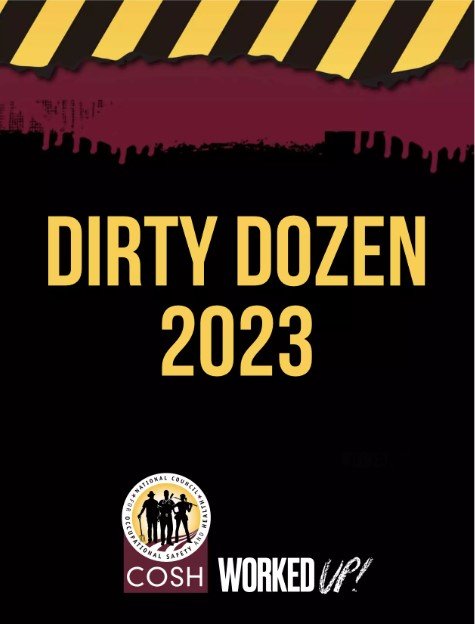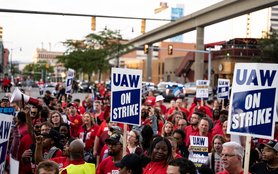Workers' Memorial Day offers a moment to remember those who died on the job, and to recommit to achieving changes that will protect the lives of ALL workers. Oxfam is proud to partner with National COSH, and to welcome guest bloggers on this vital topic.
Jessica James didn’t have to die.
Last year, James was killed three months short of her 33rd birthday at FedEx’s WorldHub in Memphis. The forklift she was driving flipped over, crushing her underneath.
Her death was no accident. James was driving on a metal ramp to deliver a load of packages into a FedEx truck. Weeks earlier, an inspection found the ramp was “severely damaged,” with a cracked surface and repairs needed on tires and bolts.
Following an investigation into James’ death, the Tennessee Occupational Safety and Health Administration (OSHA) found seven safety violations and fined FedEx $26,000. That’s a tiny fraction of the shipping giant’s $93.5 billion in revenue for 2022.
Here’s the part that’s hard to bear: James had informed her supervisors that she was driving on defective equipment. If they had acted on her concerns, her life could have been saved. But they didn’t.
“She told me that they had a meeting and said they could not afford to fix the ramp,” Jessica James’ mother, Cora James, told MLK50. “I guess if they say all they got to pay if somebody dies is $20,000, they come out cheaper keeping the ramps.”
Remembering fallen workers
Jessica’s story, along with stories about other workers who suffered preventable fatalities, injuries and illnesses, is part of this year’s Dirty Dozen report on unsafe employers.
The Dirty Dozen report is released each year by our organization, the National Council for Occupational Safety and Health to observe Workers’ Memorial Week, which takes place this year from April 23 through April 30th. This global event honors thousands of US workers who died on the job and millions who are sick or injured with candlelight vigils, prayer breakfasts, safety rallies and other events.
Workers’ Memorial Week coincides with the day US OSHA first opened its doors: April 28, 1974. It’s a time to remember workers and families who have suffered fatalities, injuries, and illnesses–and an opportunity to renew the fight for safer working conditions.
There’s plenty to fight about. In far too many workplaces, US workers face the dilemma that James confronted on the last day of her life. You know something’s wrong, but the boss doesn’t want to hear about problems that might cost money or slow down the pace of work. So you’re expected to buck up and get the job done.
The available data shows that safety problems are getting worse, not better, for America’s 160-million strong civilian workforce. The rate of fatalities from sudden trauma–3.6 deaths for every 100,000 U.S. workers–is higher than it was five years ago. So is the overall rate of injuries and illnesses caused in the workplace. The number of children working illegally in hazardous occupations is also on the rise.
Another alarming trend: Black and Brown workers die on the job at a higher rate than other workers, a consequence of past and current workplace discrimination in which workers of color are frequently assigned to the dirtiest and most dangerous jobs.
Here’s the good news
Workers aren’t waiting around to get hurt or killed. Instead, growing dangers in the workplace–thrown into sharp relief by occupational hazards that became evident during the COVID-19 pandemic–are fueling a growing movement to organize and win better working conditions.
Workers know from first-hand experience that forming a union, which creates a level playing field with employers, is an important way to advocate and win safer, more secure working conditions. This experience is backed by empirical research, which shows fewer severe injuries and fatalities in unionized settings in the mining and construction industries.
Responding to concerns about safety, scheduling, sick leave and compensation, workers are organizing to form unions at companies that previously had little or no union presence, including many of the largest corporations in the US.
Workers are also pursuing creative advocacy, legal and organizing strategies with assistance from workers centers and community-based organizations
- Restaurant workers at one restaurant in Nashville are on strike to protest verbal and physical abuse, with support from Nashville-based Workers’ Dignity, a National COSH affiliate.
- Construction workers at a car manufacturer’s giant gigafactory in Texas are pursuing legal action due to wage theft and safety violations – including evidence that contractors gave out fake safety “certificates” instead of providing real training. The Workers Defense Project, a Texas-based workers’ center focused on the construction industry, is providing legal and advocacy support.
- Farmworkers in Sonoma County, backed by North Bay Jobs with Justice, organized and won new protections from the dangers of extreme weather driven by climate change.
- Workers and families in Massachusetts are organizing to improve conditions in the growing cannabis industry after the tragic death of Lorna McMurrey, who died from a severe asthma attack after inhaling cannabis dust at a production facility. MassCOSH, also a National COSH affiliate, is assisting workers, family members and community groups in advocating for improved safety in the emerging cannabis industry.
During Workers' Memorial Week, we’ll remember workers like Jessica James and Lorna McMurrey and their families. And we’ll honor them in the best way we can: By supporting workers and families who are joining together to win safer, more secure working conditions.




